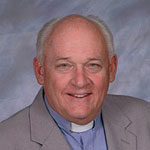
All of us have experienced some type of personal loss. We can lose many things – a job, a pet, our health, personal objects, the ending of a relationship, or grieving for our pending death. The most devastating of all losses is the death of a close loved one.
In 1969, Dr. Elisabeth Kübler-Ross described five popular stages of grief. They include: Denial, Anger, Bargaining, Depression and Acceptance. We can describe these steps as going up and down a spiral staircase. We can go from one stage to another, falling back for a while and then moving forward again. We are all different and we all deal with grief in different ways.
We look for closure after the death of a loved one. We often hear in court cases that the family of the deceased victim is looking for closure. They are hoping that a life sentence or the death penalty for the accused will bring closure. However, that never happens! Closure involves inner healing.
Dr. Ira Byock, a pioneer in the hospice movement, has given us “the five things” that promote closure. These five things can be done either before or after the death of a loved one.
- Task 1: To say I’m sorry. We all have regrets. None of us are perfect. We sometimes hurt others without realizing it. It’s important that we heal the emotional, psychological and spiritual wounds we have caused. To heal these wounds, we need to remove any unresolved issues between ourselves and our love one. The best way to accomplish this is to ask for forgiveness. To say “I am sorry” is not a weakness, but a sign of strength. Saying “I’m sorry” after the death of a loved one promotes our inner healing.
- Task 2: To offer forgiveness. We often hurt the ones we love, maybe not intentionally. Those we love have hurt us. Jesus often urged us to forgive. When St. Peter asked Jesus how often should we forgive someone, was seven times enough? Jesus said, “No. Forgive seventy times seven.” When we offer forgiveness we free ourselves from the hurts of the past so we can live in the present. Offering forgiveness is the ultimate act of self-kindness.
- Task 3: To say thank you. None of us has gotten where we are in life without the help of others. Everyone is a gift and we have received many blessings by sharing life with our love ones. Sometimes we take our love ones for granted. They are always there for us. We may assume that we show appreciation to our loved ones and consequently we do not say “thank you.” Thank them for what they gave us in the relationship.
- Task 4: To say I love you. Love is why we are grieving. For some people, saying “I love you” might be difficult. However, acknowledging this love is an affirmation of the relationship. Saying “I love you” can bring comfort and healing to our loved one. If the person is still living, love can be expressed in a card, letter, or by a simple act of touch that conveys love and caring.
- Task five: To say good-bye. This task may be difficult because of its finality. There is never a right time to say “good-bye.” Yet, good endings are important for family members and friends plus those who are facing death. If you have already lost your loved one, saying good-bye after their death is a recognition of their absence and your grief. Saying good-bye to some who is deceased does not dismiss that person from your life, or mean that your grief is over. Grief does not end, though it may stop hurting.
It is good to say these five things aloud, in your mind or on paper. Don’t be afraid to express all your felling good and bad. Closure comes from being able to articulate these feelings.


Be the first to comment